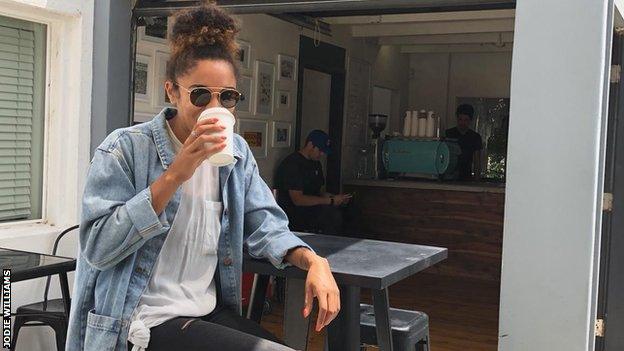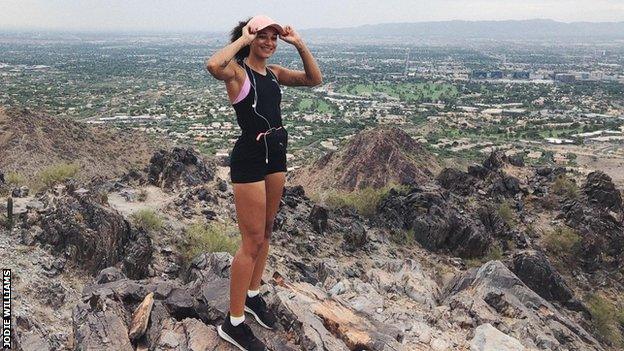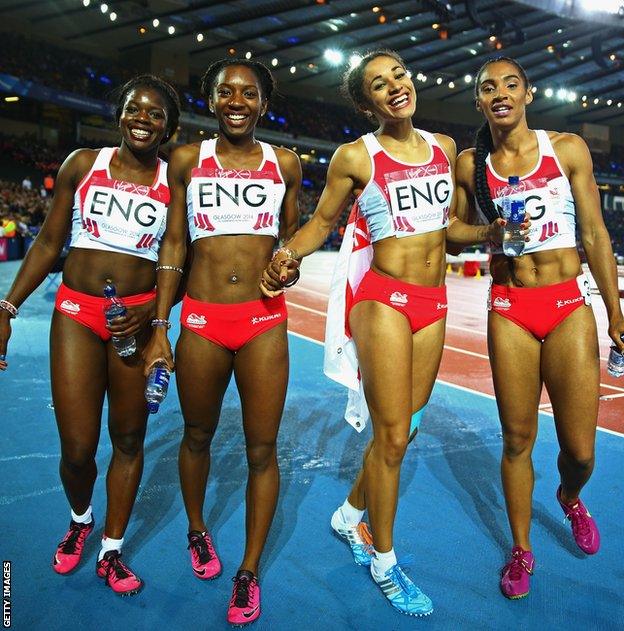Jodie Williams: GB sprinter on happiness, independence, hiking and coffee
- Published
- comments

Jodie Williams has lived in Arizona for the past four years. She ran a personal best in the 100m of 11.17 seconds in Texas in May, having set her previous PB of 11.18 eight years ago. "A calm Jodie is a fast Jodie," she says.
Jodie Williams loves coffee. So much so, in fact, that she lives next door to a cafe and on her personal website lists all the coffee shops she has visited. The tally is currently 71.
"I used to drink flat whites, but now have it straight. I'm more refined now," says the British sprinter, whose home for the past four years has been Phoenix, Arizona.
Her coffee appreciation is a pastime she squeezes into a busy weekly training schedule she is happy to help draw up. And this greater autonomy has provided contentment for the 25-year-old after the thrilling highs and frustrating lows of her early career.
Before Dina Asher-Smith broke through, it was Williams who was marked out as the Briton bound for big things.
A precocious junior talent, she was unbeaten over 151 races between 2005 and 2010, won double sprint gold at the World Youth Championships in 2009 and followed that up with 100m gold at the World Junior Championships.
Graduation to senior international titles was widely expected, but did not materialise. A hamstring problem before the London Olympics in 2012 was the first major setback, and although she won European and Commonwealth 200m silvers two years later, further injuries soon intervened.
At a loss to explain her misfortune and contemplating quitting, in 2015 Williams decided she needed a big change - so she moved 5,000 miles away to the 'Valley of the Sun' to work under Stuart McMillan, a British-born Canadian she had known since 2012 and who has coached her team-mate CJ Ujah and Canadian Andre de Grasse.

Hiking is a mainstay of Williams' weekly schedule - "it clears my head," she says
"I went to visit his camp for 10 days and that was pretty much it," she says.
"I gradually spent more and more time and before I knew it I had an apartment. Stu stripped away everything I learnt and we started again - I have a decent working relationship with him and it's gone on from there."
McMillan, she says, allowed her to provide her own input to the training programme. He does not have a say as to where Williams should go for her next coffee fix, but does provide suggestions for one of her other pursuits - the "midweek hike".
"It clears my head," adds Williams. "I sometimes go to Piestewa Peak, near the city, and there are also some hikes further north which are a little longer. I've always loved being outdoors.
"For me it's a big mental thing. I think a lot - keeping that side of me calm has been crucial to me running fast. A lot of time it has got in the way.

Williams (second from right) was part of the bronze-medal-winning 4x100m relay squad at the 2014 Commonwealths, where she also took individual 200m silver
"Stu says, 'a calm Jodie is a fast Jodie'. I get very easily worked up so it's crucial to keep calm and ensure I'm focusing on the right things."
She adds: "I've noticed support for mental wellbeing has increased. A lot of athletes have spoken out about issues and their struggles off the track and that has been really positive.
"When I was younger it wasn't as prominent and wasn't really discussed."
Her new surroundings also reflect her need for independence and to live somewhere "low-key".
"I was in nearby Scottsdale with two other girls but I recently moved out and now live on my own in downtown Phoenix," says Williams, who grew up in Hertfordshire and attended Queenswood School for Girls.
"It's a bit like an up-and-coming Shoreditch. When I'm in London I spend a lot of time there so it's nice to find something similar."
Calmer, happier and with a more refined taste in coffee, Williams has also recently shown signs of a significant revival on the track. In Texas in May, she ran a 100m personal best, ending an eight-year wait, and followed it up in Guadeloupe with the 200m qualifying standard time for September's World Championships in Doha.
Another strand of her new-found independence is that her American adventure has all been managed without the help of funding from UK Sport - which suits her fine.
"I'm an individual person and am paying for things through my own sponsorship and money I've saved up during my career," she says.
"Being independent gives me more scope for doing what I want to do and what works for me, rather than be dictated to by somebody not in my immediate circle.
"It's difficult to be tied into funding. You never know year to year what's going to happen and it puts pressure on people."
She says her communication with British Athletics is on a need-to-know basis, although being out of the "system" and living far away means it is difficult to be considered for relay programmes.
It's one small sacrifice among many bigger ones for an athlete who was once "under the microscope but is now the underdog".
Her current 'endgame' is the Tokyo 2020 Olympics and she plans to use this season to work out which of her events - the 100m, 200m and 400m - she will focus on. The aim is to compete in some events in Europe, then the British trials in August which she hopes will see her selected for the World Championships.
This will all continue to be configured 5,000 miles away from British Athletics HQ.
"Everything is going to plan," says Williams. "It's nice for things to be on track and that gives me the most satisfaction.
"I'm doing what I'm supposed to be doing and hope to continue on that trajectory. Hopefully then everything will fall into place."
BBC Sport has launched #ChangeTheGame this summer to showcase female athletes in a way they never have been before. Through more live women's sport available to watch across the BBC this summer, complemented by our journalism, we are aiming to turn up the volume on women's sport and alter perceptions. Find out more here.